外研版中考英语总复习(上册)第二篇 课本要点梳理 第七讲 八下 Modules 1-5
文档属性
| 名称 | 外研版中考英语总复习(上册)第二篇 课本要点梳理 第七讲 八下 Modules 1-5 | 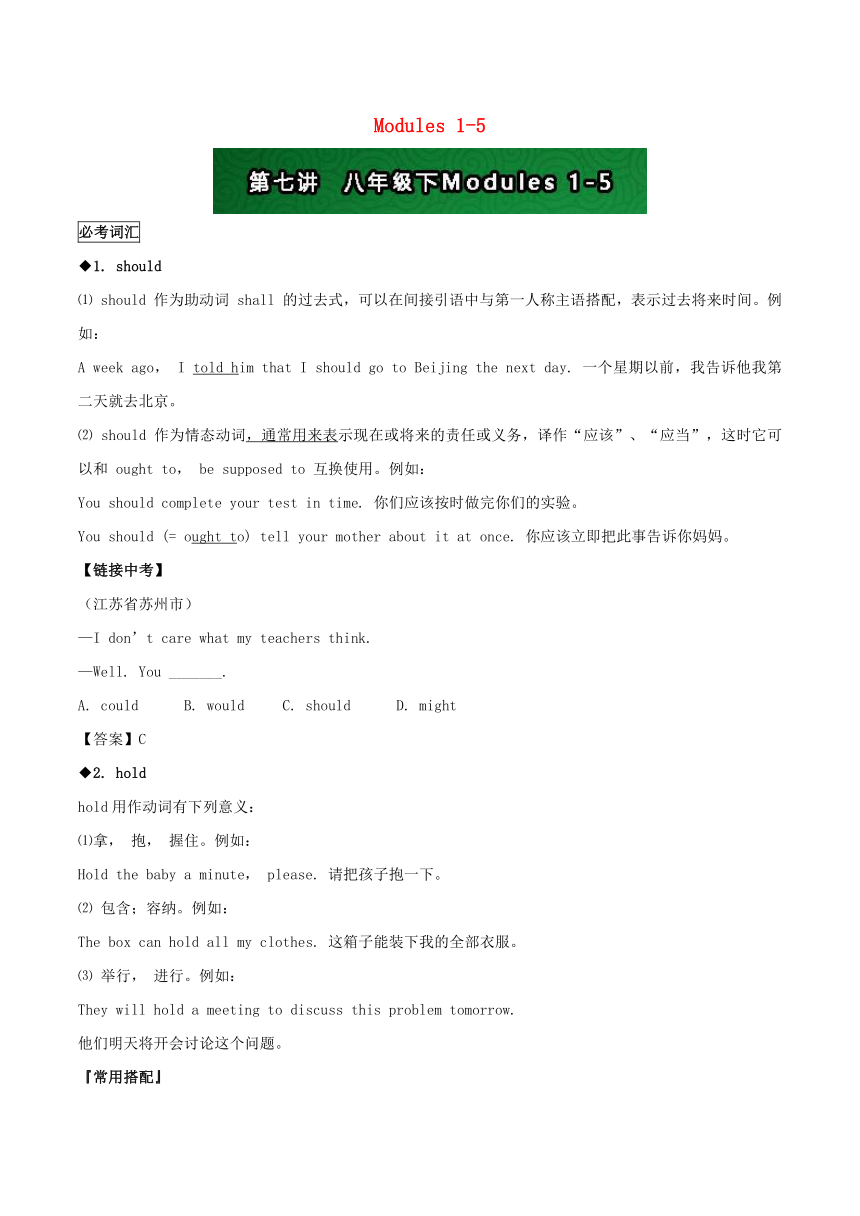 | |
| 格式 | zip | ||
| 文件大小 | 367.5KB | ||
| 资源类型 | 教案 | ||
| 版本资源 | 外研版 | ||
| 科目 | 英语 | ||
| 更新时间 | 2016-08-26 06:55:20 | ||
图片预览

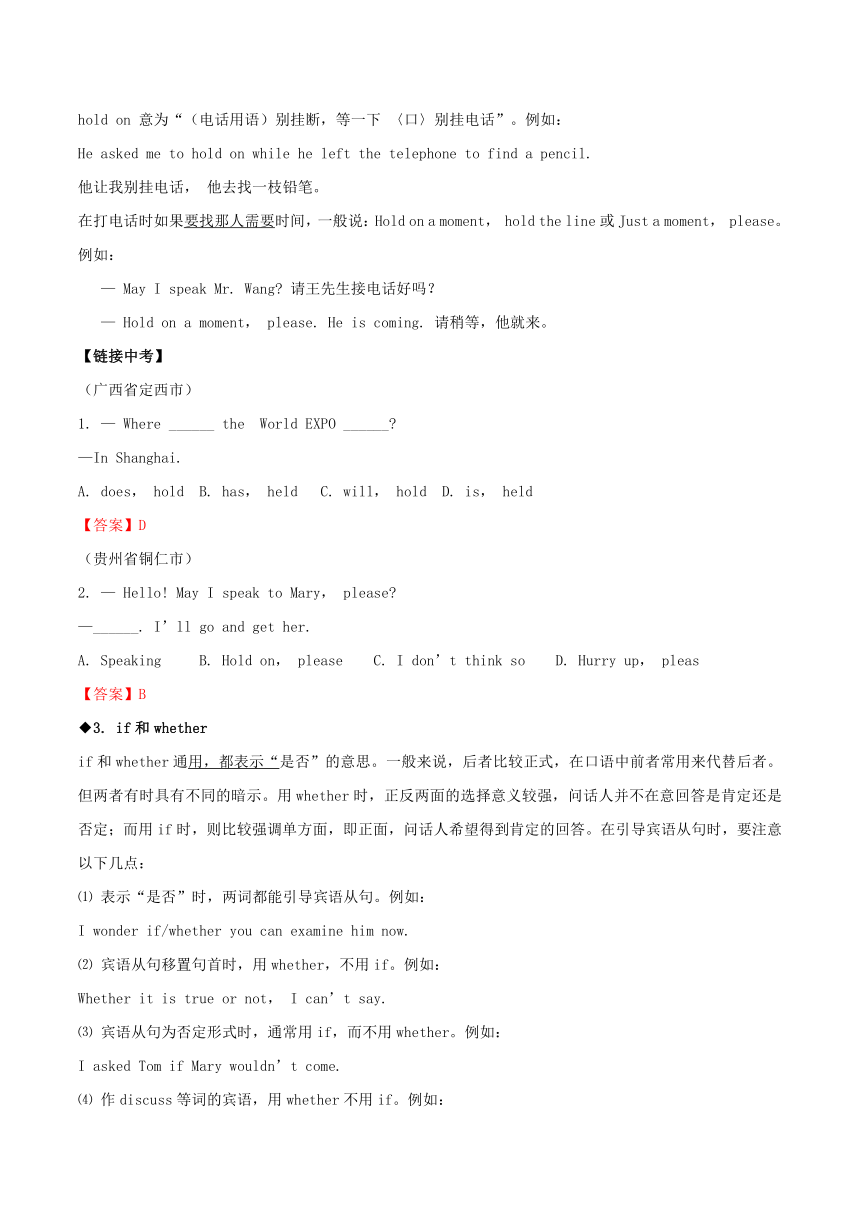
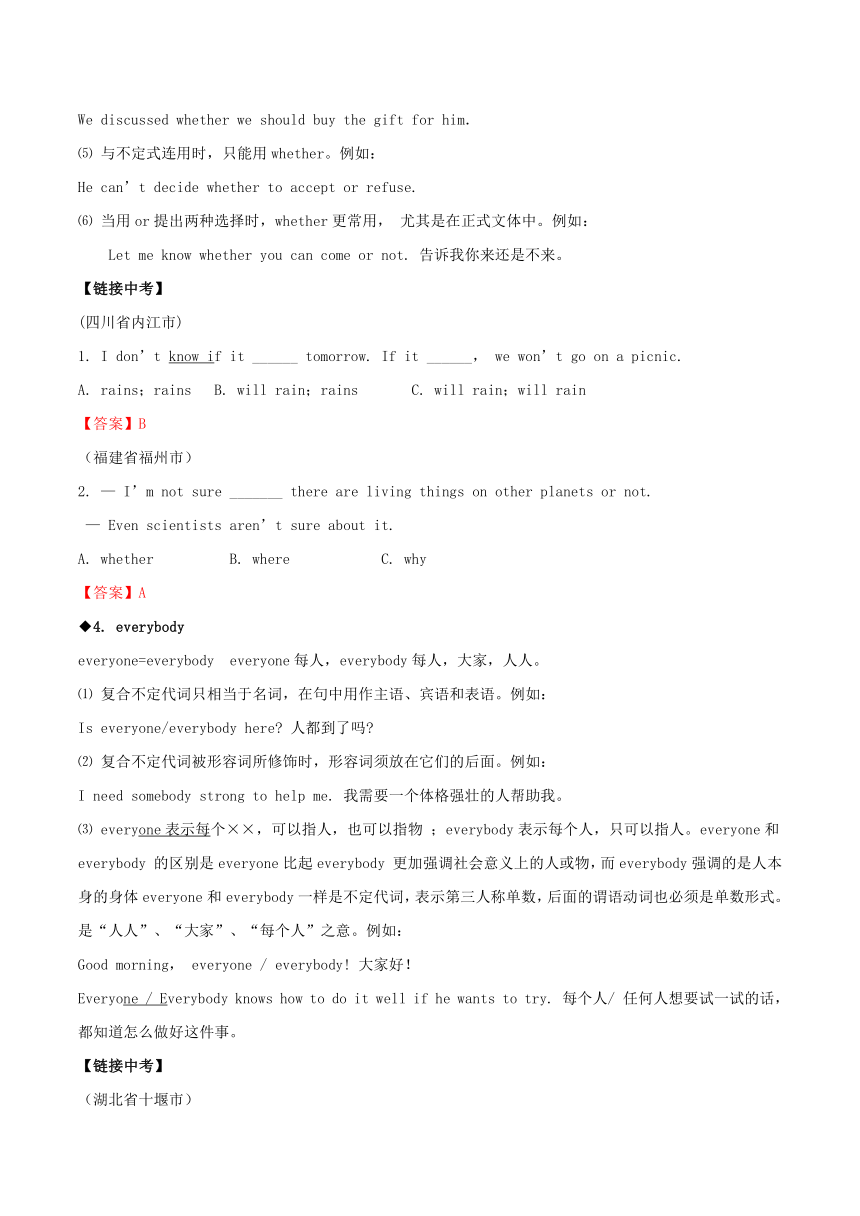
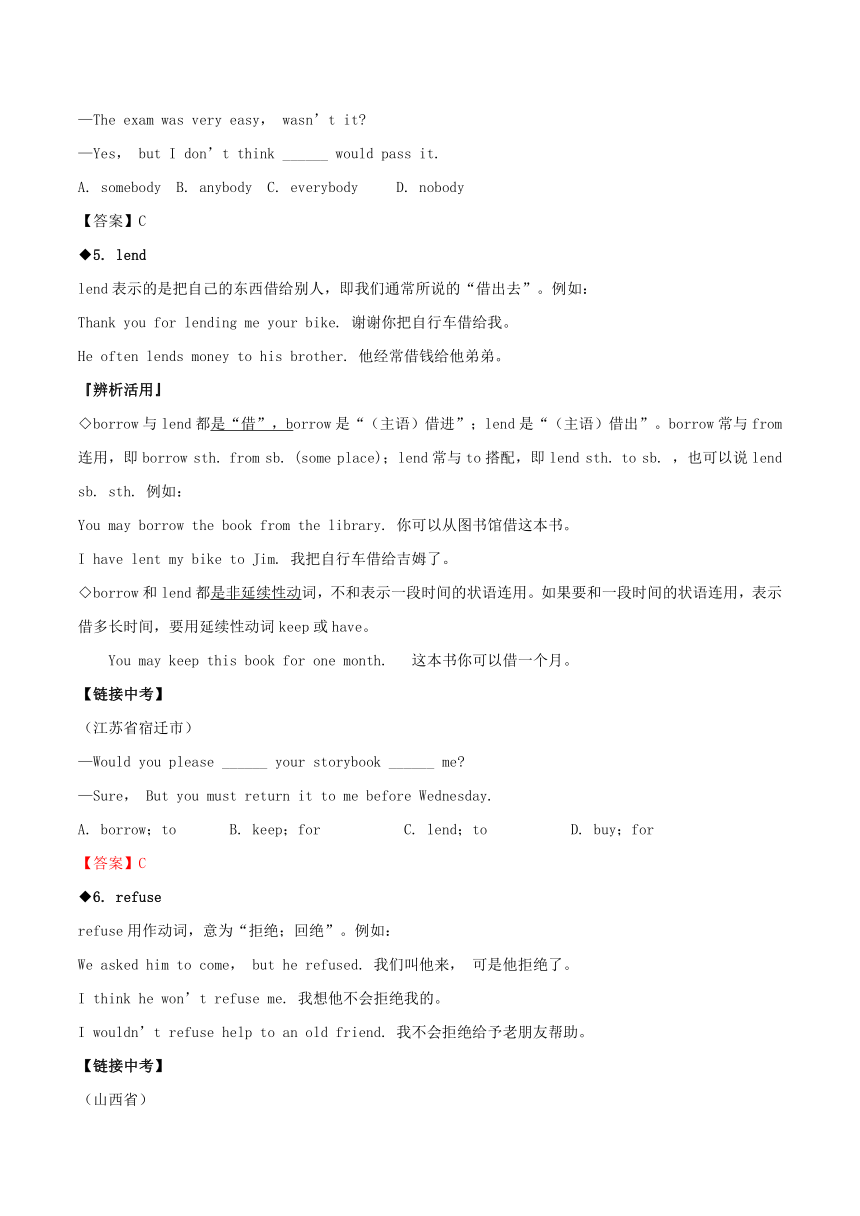
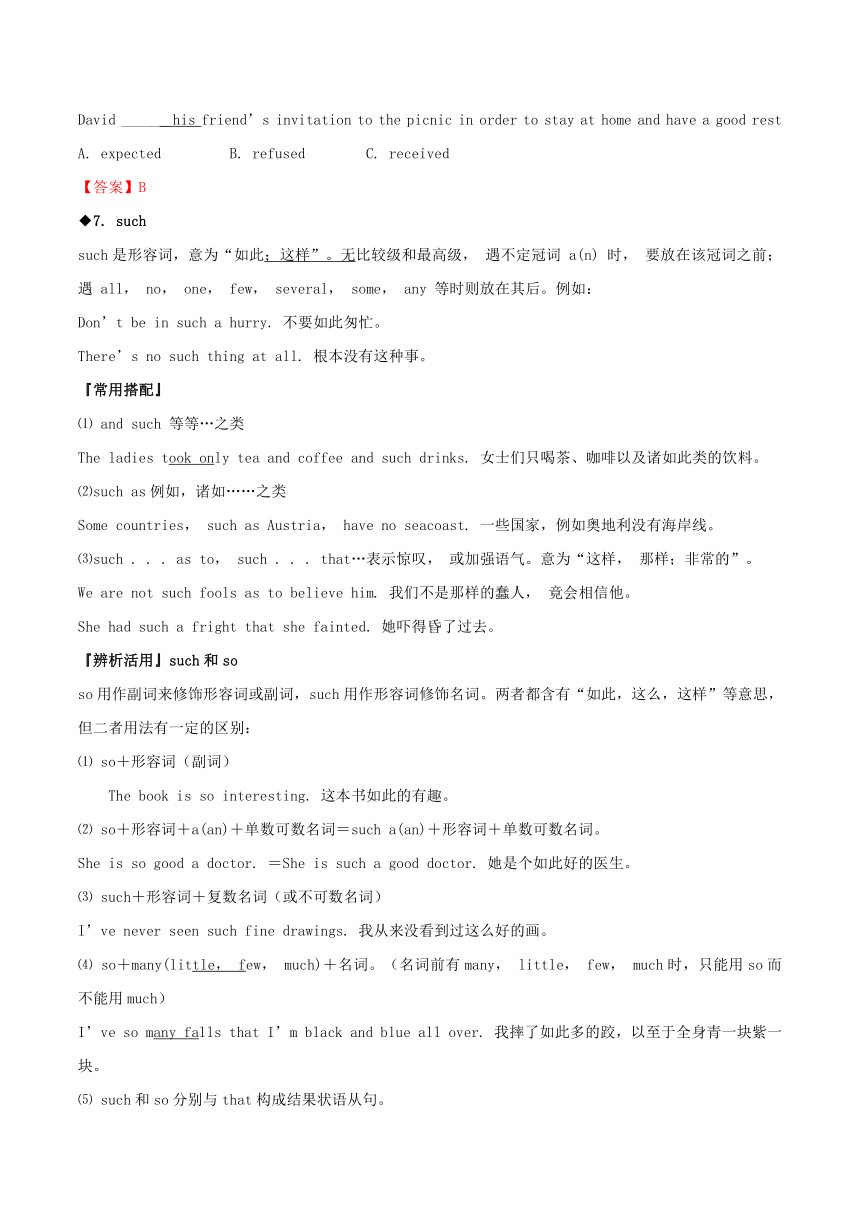
文档简介
Modules
1-5
必考词汇
◆1.
should
⑴
should
作为助动词
shall
的过去式,可以在间接引语中与第一人称主语搭配,表示过去将来时间。例如:
A
week
ago,
I
told
h
( http: / / www.21cnjy.com )im
that
I
should
go
to
Beijing
the
next
day.
一个星期以前,我告诉他我第二天就去北京。
⑵
should
作为情态动词,通常用来表
( http: / / www.21cnjy.com )示现在或将来的责任或义务,译作“应该”、“应当”,这时它可以和
ought
to,
be
supposed
to
互换使用。例如:
You
should
complete
your
test
in
time.
你们应该按时做完你们的实验。
You
should
(=
ought
t
( http: / / www.21cnjy.com )o)
tell
your
mother
about
it
at
once.
你应该立即把此事告诉你妈妈。
【链接中考】
(江苏省苏州市)
—I
don’t
care
what
my
teachers
think.
—Well.
You
_______.
A.
could
B.
would
C.
should
D.
might
【答案】C
◆2.
hold
hold用作动词有下列意义:
⑴拿,
抱,
握住。例如:
Hold
the
baby
a
minute,
please.
请把孩子抱一下。
⑵
包含;容纳。例如:
The
box
can
hold
all
my
clothes.
这箱子能装下我的全部衣服。
⑶
举行,
进行。例如:
They
will
hold
a
meeting
to
discuss
this
problem
tomorrow.
他们明天将开会讨论这个问题。
『常用搭配』
hold
on
意为“(电话用语)别挂断,等一下
〈口〉别挂电话”。例如:
He
asked
me
to
hold
on
while
he
left
the
telephone
to
find
a
pencil.
他让我别挂电话,
他去找一枝铅笔。
在打电话时如果要找那人需要
( http: / / www.21cnjy.com )时间,一般说:Hold
on
a
moment,
hold
the
line或Just
a
moment,
please。例如:
—
May
I
speak
Mr.
Wang
请王先生接电话好吗?
—
Hold
on
a
moment,
please.
He
is
coming.
请稍等,他就来。
【链接中考】
(广西省定西市)
1.
—
Where
______
the
World
EXPO
______
—In
Shanghai.
A.
does,
hold
B.
has,
held
C.
will,
hold
D.
is,
held
【答案】D
(贵州省铜仁市)
2.
—
Hello!
May
I
speak
to
Mary,
please
—______.
I’ll
go
and
get
her.
A.
Speaking
B.
Hold
on,
please
C.
I
don’t
think
so
D.
Hurry
up,
pleas
【答案】B
◆3.
if和whether
if和whether通用,都表示“
( http: / / www.21cnjy.com )是否”的意思。一般来说,后者比较正式,在口语中前者常用来代替后者。但两者有时具有不同的暗示。用whether时,正反两面的选择意义较强,问话人并不在意回答是肯定还是否定;而用if时,则比较强调单方面,即正面,问话人希望得到肯定的回答。在引导宾语从句时,要注意以下几点:
⑴
表示“是否”时,两词都能引导宾语从句。例如:
I
wonder
if/whether
you
can
examine
him
now.
⑵
宾语从句移置句首时,用whether,不用if。例如:
Whether
it
is
true
or
not,
I
can’t
say.
⑶
宾语从句为否定形式时,通常用if,而不用whether。例如:
I
asked
Tom
if
Mary
wouldn’t
come.
⑷
作discuss等词的宾语,用whether不用if。例如:
We
discussed
whether
we
should
buy
the
gift
for
him.
⑸
与不定式连用时,只能用whether。例如:
He
can’t
decide
whether
to
accept
or
refuse.
⑹
当用or提出两种选择时,whether更常用,
尤其是在正式文体中。例如:
Let
me
know
whether
you
can
come
or
not.
告诉我你来还是不来。
【链接中考】
(四川省内江市)
1.
I
don’t
know
i
( http: / / www.21cnjy.com )f
it
______
tomorrow.
If
it
______,
we
won’t
go
on
a
picnic.
A.
rains;rains
B.
will
rain;rains
C.
will
rain;will
rain
【答案】B
(福建省福州市)
2.
—
I’m
not
sure
_______
there
are
living
things
on
other
planets
or
not.
—
Even
scientists
aren’t
sure
about
it.
A.
whether
B.
where
C.
why
【答案】A
◆4.
everybody
everyone=everybody
everyone每人,everybody每人,大家,人人。
⑴
复合不定代词只相当于名词,在句中用作主语、宾语和表语。例如:
Is
everyone/everybody
here
人都到了吗
⑵
复合不定代词被形容词所修饰时,形容词须放在它们的后面。例如:
I
need
somebody
strong
to
help
me.
我需要一个体格强壮的人帮助我。
⑶
everyone表示每
( http: / / www.21cnjy.com )个××,可以指人,也可以指物
;everybody表示每个人,只可以指人。everyone和everybody
的区别是everyone比起everybody
更加强调社会意义上的人或物,而everybody强调的是人本身的身体everyone和everybody一样是不定代词,表示第三人称单数,后面的谓语动词也必须是单数形式。是“人人”、“大家”、“每个人”之意。例如:
Good
morning,
everyone
/
everybody!
大家好!
Everyone
/
E
( http: / / www.21cnjy.com )verybody
knows
how
to
do
it
well
if
he
wants
to
try.
每个人/
任何人想要试一试的话,都知道怎么做好这件事。
【链接中考】
(湖北省十堰市)
—The
exam
was
very
easy,
wasn’t
it
—Yes,
but
I
don’t
think
______
would
pass
it.
A.
somebody
B.
anybody
C.
everybody
D.
nobody
【答案】C
◆5.
lend
lend表示的是把自己的东西借给别人,即我们通常所说的“借出去”。例如:
Thank
you
for
lending
me
your
bike.
谢谢你把自行车借给我。
He
often
lends
money
to
his
brother.
他经常借钱给他弟弟。
『辨析活用』
◇borrow与lend都是“借”,b
( http: / / www.21cnjy.com )orrow是“(主语)借进”;lend是“(主语)借出”。borrow常与from连用,即borrow
sth.
from
sb.
(some
place);lend常与to搭配,即lend
sth.
to
sb.
,也可以说lend
sb.
sth.
例如:
You
may
borrow
the
book
from
the
library.
你可以从图书馆借这本书。
I
have
lent
my
bike
to
Jim.
我把自行车借给吉姆了。
◇borrow和lend都是非延续性动
( http: / / www.21cnjy.com )词,不和表示一段时间的状语连用。如果要和一段时间的状语连用,表示借多长时间,要用延续性动词keep或have。
You
may
keep
this
book
for
one
month.
这本书你可以借一个月。
【链接中考】
(江苏省宿迁市)
—Would
you
please
______
your
storybook
______
me
—Sure,
But
you
must
return
it
to
me
before
Wednesday.
A.
borrow;to
B.
keep;for
C.
lend;to
D.
buy;for
【答案】C
◆6.
refuse
refuse用作动词,意为“拒绝;回绝”。例如:
We
asked
him
to
come,
but
he
refused.
我们叫他来,
可是他拒绝了。
I
think
he
won’t
refuse
me.
我想他不会拒绝我的。
I
wouldn’t
refuse
help
to
an
old
friend.
我不会拒绝给予老朋友帮助。
【链接中考】
(山西省)
David
______
his
( http: / / www.21cnjy.com )friend’s
invitation
to
the
picnic
in
order
to
stay
at
home
and
have
a
good
rest
A.
expected
B.
refused
C.
received
【答案】B
◆7.
such
such是形容词,意为“如此;这样”。无
( http: / / www.21cnjy.com )比较级和最高级,
遇不定冠词
a(n)
时,
要放在该冠词之前;遇
all,
no,
one,
few,
several,
some,
any
等时则放在其后。例如:
Don’t
be
in
such
a
hurry.
不要如此匆忙。
There’s
no
such
thing
at
all.
根本没有这种事。
『常用搭配』
⑴
and
such
等等…之类
The
ladies
took
on
( http: / / www.21cnjy.com )ly
tea
and
coffee
and
such
drinks.
女士们只喝茶、咖啡以及诸如此类的饮料。
⑵such
as例如,诸如……之类
Some
countries,
such
as
Austria,
have
no
seacoast.
一些国家,例如奥地利没有海岸线。
⑶such
.
.
.
as
to,
such
.
.
.
that…表示惊叹,
或加强语气。意为“这样,
那样;非常的”。
We
are
not
such
fools
as
to
believe
him.
我们不是那样的蠢人,
竟会相信他。
She
had
such
a
fright
that
she
fainted.
她吓得昏了过去。
『辨析活用』such和so
so用作副词来修饰形容词或副词,such用作形容词修饰名词。两者都含有“如此,这么,这样”等意思,但二者用法有一定的区别:
⑴
so+形容词(副词)
The
book
is
so
interesting.
这本书如此的有趣。
⑵
so+形容词+a(an)+单数可数名词=such
a(an)+形容词+单数可数名词。
She
is
so
good
a
doctor.
=She
is
such
a
good
doctor.
她是个如此好的医生。
⑶
such+形容词+复数名词(或不可数名词)
I’ve
never
seen
such
fine
drawings.
我从来没看到过这么好的画。
⑷
so+many(little,
f
( http: / / www.21cnjy.com )ew,
much)+名词。(名词前有many,
little,
few,
much时,只能用so而不能用much)
I’ve
so
many
fa
( http: / / www.21cnjy.com )lls
that
I’m
black
and
blue
all
over.
我摔了如此多的跤,以至于全身青一块紫一块。
⑸
such和so分别与that构成结果状语从句。
①such
a(an)+形容词+单数名词+that…
②such+形容词+复数名词+that…
③so+形容词(副词)+that…
这三个句型都译作“如此……以至于……”。
It
was
such
a
cold
day
that
we
didn’t
go
out.
天气太冷,我们没有出去。
It
was
so
cold
that
we
didn’t
go
out.
天气太冷,我们没有出去。
⑹such…that…与so…that…可以互换。
This
is
such
an
interesting
book
that
I
have
read
it
twice.
=This
is
so
interes
( http: / / www.21cnjy.com )ting
a
book
that
I
have
read
it
twice.
这本书是如此的有趣,以至于我读了两遍。
【链接中考】
(江苏省宿迁市)
1.
This
is
_______
difficult
problem
that
few
students
can
work
it
out.
A.
so
B.
so
a
C.
such
D.
such
a
【答案】D
(黑龙江省哈尔滨市)
2.
The
FIFA
Wo
( http: / / www.21cnjy.com )rld
Cup
is
_______
fantastic
that
a
lot
of
people
in
the
world
are
crazy
(疯狂的)
about
it.
A.
such
B.
so
C.
very
【答案】B
常考短语
◆1.
be
interested
in
interested是形容词。有被动意
( http: / / www.21cnjy.com )味,意为“感兴趣的、对……感兴趣”,主语通常是人,且多用于be/get/feel/become
interested
in结构中。例如:
He
is
interested
in
playing
football.
他对踢足球感兴趣。
『辨析活用』
◇interest用作不可数名词时意为“兴趣、趣味”;用作动词时意为“使(人)发生兴趣”,其主语多为事物。
American
Football
doesn’t
interest
me
at
all.
美式足球一点也提不起我的兴趣。
◇interesting是形容词,有主动意味,意为“令人有趣的”。作表语时,主语通常是
物。作定语时,既可修饰人,也可修饰物。
That’s
an
interesting
storybook
for
children.
那是一本有趣的儿童故事书。
【链接中考】
(江苏省镇江市)
Mr.
Brown
always
ma
( http: / / www.21cnjy.com )kes
his
class
_______
and
keeps
his
students
_______
in
class.
A.
alive;interesting
B.
lively;interesting
C.
alive;interested
D.
lively;interested
【答案】D
◆2.
come
out
come
out动词短语,意为“出版;发表”。例如:
When
will
the
dictionary
come
out
那本字典什么时候出版
That
year
they
came
out
with
another
article.
那一年他们又发表了一篇文章。
【链接中考】
(湖北省荆门市)
Another
new
fiction
( http: / / www.21cnjy.com )by
HanHan
is
being
printed
and
it
will
soon
.
A.
come
out
B.
set
out
C.
sell
out
D.
work
out
【答案】A
◆3.
as
a
result
as
a
result
意为“因此,结果是”,在句子中一般用逗号与其后面的分句隔开。
例如:
As
a
result,
he
had
to
leave.
结果他只得离开。
【拓展】as
a
result
of
sth.
意为“由于……的原因”,其后跟名词后名词性短语,但不跟句子。
例如:
As
a
result
of
automob
( http: / / www.21cnjy.com )ile
pollution,
the
air
quality
in
most
major
cities
has
been
lowered.
汽车污染的后果是各主要城市的空气质量有所降低。
【链接中考】
(山东省)
A
“Workaholic”
wor
( http: / / www.21cnjy.com )ks
too
much
and
usually
forgets
to
have
meals
and
go
to
bed.
______,
he
doesn’t
have
good
health.
A.
As
a
matter
of
fact
B.
As
a
whole
C.
As
a
result
D.
As
a
rule
【答案】C
◆4.
turn
off
turn
off
表示“关掉(收音机,电灯,水龙头等)”;其反义词组为turn
on,表示“打开(收音机,电灯,水龙头等)”。例如:
Turn
off
the
light
before
you
go
out.
出去时请关灯。
Please
turn
on
the
radio
(the
music,
the
water).
请把收音机(音乐,自来水)打开。
注意:有时它们也用作不及物动词,其后不接宾语。比较:
I
can’t
turn
off
the
tap.
我无法把龙头关上。
The
tap
won’t
turn
off.
这龙头关不上。
【链接中考】
(新疆省阜康市)
Don’t
______
the
light,
I
______
a
report.
A.
turned
off;have
read
B.
turn
off;am
reading
C.
turned
on;have
read
D.
turned
on;am
reading
【答案】B
◆5.
at
least
at
least是副词,意为“至少
”。例如:
It’ll
cost
at
least
500
dollars.
这东西至少要花
500
元。
Cut
the
grass
at
least
once
a
week
in
summer.
夏天至少每周割草一次。
⑴
用于对否定情况补充肯定的评论,意为“起码”。例如:
She
may
be
slow
but
at
least
she’s
honest.
她虽然迟钝,但起码还很诚实。
⑵
用以减轻前面所说的话的肯定性,意为“至少”。例如:
They
seldom
complained—officially
at
least.
他们很少抱怨
至少不在正式场合抱怨。
It
works,
at
least
I
think
it
does.
它行,反正我认为它行。
『常用搭配』
at
(the)
least
至少;at
the
least
至少;at
the
(very)
least
(用于数量之后)至少,最少
【链接中考】
(江苏省镇江市)
The
Gulf
of
Mexico(
( http: / / www.21cnjy.com )墨西哥湾)
is
being
polluted
seriously.
That
has
affected
_______
several
hundred
kinds
of
sea
animals
there.
A.
at
least
B.
at
once
C.
at
birth
D.
at
times
【答案】A
经典句型
◆1.
He
spent
four
weeks
on
a
summer
camp.
spend作“花费”讲,既可用作“花钱”
( http: / / www.21cnjy.com ),也可用作“花时间”。人作主语。用在表示“为某事而花钱”时,后接介词on。即:spend
some
money
on
sth.
例如:
She
spent
five
dollars
on
the
dictionary.
她买那本词典花了五美元。
◇表示“花时间做某事”时,可接on
( http: / / www.21cnjy.com )+名词或in+动词ing。形式,in可省去。即spend
some
time
on
sth.
或spend
some
time
(in)
doing
sth.
【链接中考】
(四川达州)
1.
—
Your
watch
is
so
beautiful.
It
must
be
expensive.
—
Not
at
all.
I
only
¥20
on
it.
A.
cost
B.
spent
C.
paid
D.
took
【答案】B
(四川省自贡市)
2.
They
spent
all
night
_______
the
work.
A.
doing
B.
did
C.
to
do
【答案】A
◆2.
Why
not
Why
not.
.
.
是W
( http: / / www.21cnjy.com )hy
don’t
you.
.
.
的简略形式,意为“为什么不……呢?”,用来间接提出建议。Why
not后接动词原形。例如:
①—Why
not
go
to
the
park
on
foot
It’s
quite
near.
为什么不步行去公园?公园很近。
—All
right!好的!
②Why
not
ask
Mr.
Wu
help
us
为什么不请吴老师帮助我们呢?
【链接中考】
(湖北省宜昌市)
1.
—
A
new
3D
movie
is
on.
Shall
we
go
and
see
it
this
weekend
—________!
What’s
it
A.
I
must
be
going
now
B.
You
are
right
C.
Why
not
D.
My
pleasure
【答案】C
(四川达州)
2.
Why
not
an
English
club
to
practice
English
A.
to
join;to
speak
B.
join;speaking
C.
join;to
speak
D.
to
join;speaking
【答案】B
◆3.
I
remember
sitting
close
to
the
radio
in
the
living
room,…
⑴
remember
to
do
sth.
记住要做某事。例如:
Remember
to
post
the
letter
for
me.
记住给我邮这封信。
⑵
remember
doing
sth.
记得做过某事。例如:
I
remember
seeing
him
once.
我记得见过他一次。
(山东省)
—You
aren’t
a
stranger,
are
you
—______,
don’t
you
( http: / / www.21cnjy.com )remember
______
me
at
the
school
gate
ten
minutes
ago
A.
Yes;to
see
B.
No;seeing
C.
No;saw
D.
Yes;seeing
【答案】B
◆4.
If
I
play
well,
I’ll
play
the
solo.
这是含有if引导条件状语从句的复合句。if从句可放在句首,也可放在句尾。在下列三种情况下,if引导的条件状语从句要用一般现在时表示将来。
⑴
主句中有will,
shall,
won’t等将来谓语。例如:
We
won’t
go
sh
( http: / / www.21cnjy.com )opping
if
it
rains
tomorrow.
如果明天下雨,我们就不去买东西。
⑵主句中有may,
can,
must等情态动词。例如:
If
you
want
t
( http: / / www.21cnjy.com )o
be
a
college
student,
you
must
study
hard.
如果你想成为大学生,就必须努力学习。
⑶主句是祈使句。例如:
Please
come
to
see
me
if
you
have
time.
如果有时间,请过来看我。
【链接中考】
(上海市)
1.
We
will
have
no
water
to
drink
_______we
don’t
protect
the
earth.
A.
until
B.
before
C.
though
D.
if
【答案】D
(四川省内江市)
2.
I
don’t
know
if
it
( http: / / www.21cnjy.com )
______
tomorrow.
If
it
______,
we
won’t
go
on
a
picnic.
A.
rains;rains
B.
will
rain;rains
C.
will
rain;will
rain
【答案】B
( http: / / www.21cnjy.com )
1-5
必考词汇
◆1.
should
⑴
should
作为助动词
shall
的过去式,可以在间接引语中与第一人称主语搭配,表示过去将来时间。例如:
A
week
ago,
I
told
h
( http: / / www.21cnjy.com )im
that
I
should
go
to
Beijing
the
next
day.
一个星期以前,我告诉他我第二天就去北京。
⑵
should
作为情态动词,通常用来表
( http: / / www.21cnjy.com )示现在或将来的责任或义务,译作“应该”、“应当”,这时它可以和
ought
to,
be
supposed
to
互换使用。例如:
You
should
complete
your
test
in
time.
你们应该按时做完你们的实验。
You
should
(=
ought
t
( http: / / www.21cnjy.com )o)
tell
your
mother
about
it
at
once.
你应该立即把此事告诉你妈妈。
【链接中考】
(江苏省苏州市)
—I
don’t
care
what
my
teachers
think.
—Well.
You
_______.
A.
could
B.
would
C.
should
D.
might
【答案】C
◆2.
hold
hold用作动词有下列意义:
⑴拿,
抱,
握住。例如:
Hold
the
baby
a
minute,
please.
请把孩子抱一下。
⑵
包含;容纳。例如:
The
box
can
hold
all
my
clothes.
这箱子能装下我的全部衣服。
⑶
举行,
进行。例如:
They
will
hold
a
meeting
to
discuss
this
problem
tomorrow.
他们明天将开会讨论这个问题。
『常用搭配』
hold
on
意为“(电话用语)别挂断,等一下
〈口〉别挂电话”。例如:
He
asked
me
to
hold
on
while
he
left
the
telephone
to
find
a
pencil.
他让我别挂电话,
他去找一枝铅笔。
在打电话时如果要找那人需要
( http: / / www.21cnjy.com )时间,一般说:Hold
on
a
moment,
hold
the
line或Just
a
moment,
please。例如:
—
May
I
speak
Mr.
Wang
请王先生接电话好吗?
—
Hold
on
a
moment,
please.
He
is
coming.
请稍等,他就来。
【链接中考】
(广西省定西市)
1.
—
Where
______
the
World
EXPO
______
—In
Shanghai.
A.
does,
hold
B.
has,
held
C.
will,
hold
D.
is,
held
【答案】D
(贵州省铜仁市)
2.
—
Hello!
May
I
speak
to
Mary,
please
—______.
I’ll
go
and
get
her.
A.
Speaking
B.
Hold
on,
please
C.
I
don’t
think
so
D.
Hurry
up,
pleas
【答案】B
◆3.
if和whether
if和whether通用,都表示“
( http: / / www.21cnjy.com )是否”的意思。一般来说,后者比较正式,在口语中前者常用来代替后者。但两者有时具有不同的暗示。用whether时,正反两面的选择意义较强,问话人并不在意回答是肯定还是否定;而用if时,则比较强调单方面,即正面,问话人希望得到肯定的回答。在引导宾语从句时,要注意以下几点:
⑴
表示“是否”时,两词都能引导宾语从句。例如:
I
wonder
if/whether
you
can
examine
him
now.
⑵
宾语从句移置句首时,用whether,不用if。例如:
Whether
it
is
true
or
not,
I
can’t
say.
⑶
宾语从句为否定形式时,通常用if,而不用whether。例如:
I
asked
Tom
if
Mary
wouldn’t
come.
⑷
作discuss等词的宾语,用whether不用if。例如:
We
discussed
whether
we
should
buy
the
gift
for
him.
⑸
与不定式连用时,只能用whether。例如:
He
can’t
decide
whether
to
accept
or
refuse.
⑹
当用or提出两种选择时,whether更常用,
尤其是在正式文体中。例如:
Let
me
know
whether
you
can
come
or
not.
告诉我你来还是不来。
【链接中考】
(四川省内江市)
1.
I
don’t
know
i
( http: / / www.21cnjy.com )f
it
______
tomorrow.
If
it
______,
we
won’t
go
on
a
picnic.
A.
rains;rains
B.
will
rain;rains
C.
will
rain;will
rain
【答案】B
(福建省福州市)
2.
—
I’m
not
sure
_______
there
are
living
things
on
other
planets
or
not.
—
Even
scientists
aren’t
sure
about
it.
A.
whether
B.
where
C.
why
【答案】A
◆4.
everybody
everyone=everybody
everyone每人,everybody每人,大家,人人。
⑴
复合不定代词只相当于名词,在句中用作主语、宾语和表语。例如:
Is
everyone/everybody
here
人都到了吗
⑵
复合不定代词被形容词所修饰时,形容词须放在它们的后面。例如:
I
need
somebody
strong
to
help
me.
我需要一个体格强壮的人帮助我。
⑶
everyone表示每
( http: / / www.21cnjy.com )个××,可以指人,也可以指物
;everybody表示每个人,只可以指人。everyone和everybody
的区别是everyone比起everybody
更加强调社会意义上的人或物,而everybody强调的是人本身的身体everyone和everybody一样是不定代词,表示第三人称单数,后面的谓语动词也必须是单数形式。是“人人”、“大家”、“每个人”之意。例如:
Good
morning,
everyone
/
everybody!
大家好!
Everyone
/
E
( http: / / www.21cnjy.com )verybody
knows
how
to
do
it
well
if
he
wants
to
try.
每个人/
任何人想要试一试的话,都知道怎么做好这件事。
【链接中考】
(湖北省十堰市)
—The
exam
was
very
easy,
wasn’t
it
—Yes,
but
I
don’t
think
______
would
pass
it.
A.
somebody
B.
anybody
C.
everybody
D.
nobody
【答案】C
◆5.
lend
lend表示的是把自己的东西借给别人,即我们通常所说的“借出去”。例如:
Thank
you
for
lending
me
your
bike.
谢谢你把自行车借给我。
He
often
lends
money
to
his
brother.
他经常借钱给他弟弟。
『辨析活用』
◇borrow与lend都是“借”,b
( http: / / www.21cnjy.com )orrow是“(主语)借进”;lend是“(主语)借出”。borrow常与from连用,即borrow
sth.
from
sb.
(some
place);lend常与to搭配,即lend
sth.
to
sb.
,也可以说lend
sb.
sth.
例如:
You
may
borrow
the
book
from
the
library.
你可以从图书馆借这本书。
I
have
lent
my
bike
to
Jim.
我把自行车借给吉姆了。
◇borrow和lend都是非延续性动
( http: / / www.21cnjy.com )词,不和表示一段时间的状语连用。如果要和一段时间的状语连用,表示借多长时间,要用延续性动词keep或have。
You
may
keep
this
book
for
one
month.
这本书你可以借一个月。
【链接中考】
(江苏省宿迁市)
—Would
you
please
______
your
storybook
______
me
—Sure,
But
you
must
return
it
to
me
before
Wednesday.
A.
borrow;to
B.
keep;for
C.
lend;to
D.
buy;for
【答案】C
◆6.
refuse
refuse用作动词,意为“拒绝;回绝”。例如:
We
asked
him
to
come,
but
he
refused.
我们叫他来,
可是他拒绝了。
I
think
he
won’t
refuse
me.
我想他不会拒绝我的。
I
wouldn’t
refuse
help
to
an
old
friend.
我不会拒绝给予老朋友帮助。
【链接中考】
(山西省)
David
______
his
( http: / / www.21cnjy.com )friend’s
invitation
to
the
picnic
in
order
to
stay
at
home
and
have
a
good
rest
A.
expected
B.
refused
C.
received
【答案】B
◆7.
such
such是形容词,意为“如此;这样”。无
( http: / / www.21cnjy.com )比较级和最高级,
遇不定冠词
a(n)
时,
要放在该冠词之前;遇
all,
no,
one,
few,
several,
some,
any
等时则放在其后。例如:
Don’t
be
in
such
a
hurry.
不要如此匆忙。
There’s
no
such
thing
at
all.
根本没有这种事。
『常用搭配』
⑴
and
such
等等…之类
The
ladies
took
on
( http: / / www.21cnjy.com )ly
tea
and
coffee
and
such
drinks.
女士们只喝茶、咖啡以及诸如此类的饮料。
⑵such
as例如,诸如……之类
Some
countries,
such
as
Austria,
have
no
seacoast.
一些国家,例如奥地利没有海岸线。
⑶such
.
.
.
as
to,
such
.
.
.
that…表示惊叹,
或加强语气。意为“这样,
那样;非常的”。
We
are
not
such
fools
as
to
believe
him.
我们不是那样的蠢人,
竟会相信他。
She
had
such
a
fright
that
she
fainted.
她吓得昏了过去。
『辨析活用』such和so
so用作副词来修饰形容词或副词,such用作形容词修饰名词。两者都含有“如此,这么,这样”等意思,但二者用法有一定的区别:
⑴
so+形容词(副词)
The
book
is
so
interesting.
这本书如此的有趣。
⑵
so+形容词+a(an)+单数可数名词=such
a(an)+形容词+单数可数名词。
She
is
so
good
a
doctor.
=She
is
such
a
good
doctor.
她是个如此好的医生。
⑶
such+形容词+复数名词(或不可数名词)
I’ve
never
seen
such
fine
drawings.
我从来没看到过这么好的画。
⑷
so+many(little,
f
( http: / / www.21cnjy.com )ew,
much)+名词。(名词前有many,
little,
few,
much时,只能用so而不能用much)
I’ve
so
many
fa
( http: / / www.21cnjy.com )lls
that
I’m
black
and
blue
all
over.
我摔了如此多的跤,以至于全身青一块紫一块。
⑸
such和so分别与that构成结果状语从句。
①such
a(an)+形容词+单数名词+that…
②such+形容词+复数名词+that…
③so+形容词(副词)+that…
这三个句型都译作“如此……以至于……”。
It
was
such
a
cold
day
that
we
didn’t
go
out.
天气太冷,我们没有出去。
It
was
so
cold
that
we
didn’t
go
out.
天气太冷,我们没有出去。
⑹such…that…与so…that…可以互换。
This
is
such
an
interesting
book
that
I
have
read
it
twice.
=This
is
so
interes
( http: / / www.21cnjy.com )ting
a
book
that
I
have
read
it
twice.
这本书是如此的有趣,以至于我读了两遍。
【链接中考】
(江苏省宿迁市)
1.
This
is
_______
difficult
problem
that
few
students
can
work
it
out.
A.
so
B.
so
a
C.
such
D.
such
a
【答案】D
(黑龙江省哈尔滨市)
2.
The
FIFA
Wo
( http: / / www.21cnjy.com )rld
Cup
is
_______
fantastic
that
a
lot
of
people
in
the
world
are
crazy
(疯狂的)
about
it.
A.
such
B.
so
C.
very
【答案】B
常考短语
◆1.
be
interested
in
interested是形容词。有被动意
( http: / / www.21cnjy.com )味,意为“感兴趣的、对……感兴趣”,主语通常是人,且多用于be/get/feel/become
interested
in结构中。例如:
He
is
interested
in
playing
football.
他对踢足球感兴趣。
『辨析活用』
◇interest用作不可数名词时意为“兴趣、趣味”;用作动词时意为“使(人)发生兴趣”,其主语多为事物。
American
Football
doesn’t
interest
me
at
all.
美式足球一点也提不起我的兴趣。
◇interesting是形容词,有主动意味,意为“令人有趣的”。作表语时,主语通常是
物。作定语时,既可修饰人,也可修饰物。
That’s
an
interesting
storybook
for
children.
那是一本有趣的儿童故事书。
【链接中考】
(江苏省镇江市)
Mr.
Brown
always
ma
( http: / / www.21cnjy.com )kes
his
class
_______
and
keeps
his
students
_______
in
class.
A.
alive;interesting
B.
lively;interesting
C.
alive;interested
D.
lively;interested
【答案】D
◆2.
come
out
come
out动词短语,意为“出版;发表”。例如:
When
will
the
dictionary
come
out
那本字典什么时候出版
That
year
they
came
out
with
another
article.
那一年他们又发表了一篇文章。
【链接中考】
(湖北省荆门市)
Another
new
fiction
( http: / / www.21cnjy.com )by
HanHan
is
being
printed
and
it
will
soon
.
A.
come
out
B.
set
out
C.
sell
out
D.
work
out
【答案】A
◆3.
as
a
result
as
a
result
意为“因此,结果是”,在句子中一般用逗号与其后面的分句隔开。
例如:
As
a
result,
he
had
to
leave.
结果他只得离开。
【拓展】as
a
result
of
sth.
意为“由于……的原因”,其后跟名词后名词性短语,但不跟句子。
例如:
As
a
result
of
automob
( http: / / www.21cnjy.com )ile
pollution,
the
air
quality
in
most
major
cities
has
been
lowered.
汽车污染的后果是各主要城市的空气质量有所降低。
【链接中考】
(山东省)
A
“Workaholic”
wor
( http: / / www.21cnjy.com )ks
too
much
and
usually
forgets
to
have
meals
and
go
to
bed.
______,
he
doesn’t
have
good
health.
A.
As
a
matter
of
fact
B.
As
a
whole
C.
As
a
result
D.
As
a
rule
【答案】C
◆4.
turn
off
turn
off
表示“关掉(收音机,电灯,水龙头等)”;其反义词组为turn
on,表示“打开(收音机,电灯,水龙头等)”。例如:
Turn
off
the
light
before
you
go
out.
出去时请关灯。
Please
turn
on
the
radio
(the
music,
the
water).
请把收音机(音乐,自来水)打开。
注意:有时它们也用作不及物动词,其后不接宾语。比较:
I
can’t
turn
off
the
tap.
我无法把龙头关上。
The
tap
won’t
turn
off.
这龙头关不上。
【链接中考】
(新疆省阜康市)
Don’t
______
the
light,
I
______
a
report.
A.
turned
off;have
read
B.
turn
off;am
reading
C.
turned
on;have
read
D.
turned
on;am
reading
【答案】B
◆5.
at
least
at
least是副词,意为“至少
”。例如:
It’ll
cost
at
least
500
dollars.
这东西至少要花
500
元。
Cut
the
grass
at
least
once
a
week
in
summer.
夏天至少每周割草一次。
⑴
用于对否定情况补充肯定的评论,意为“起码”。例如:
She
may
be
slow
but
at
least
she’s
honest.
她虽然迟钝,但起码还很诚实。
⑵
用以减轻前面所说的话的肯定性,意为“至少”。例如:
They
seldom
complained—officially
at
least.
他们很少抱怨
至少不在正式场合抱怨。
It
works,
at
least
I
think
it
does.
它行,反正我认为它行。
『常用搭配』
at
(the)
least
至少;at
the
least
至少;at
the
(very)
least
(用于数量之后)至少,最少
【链接中考】
(江苏省镇江市)
The
Gulf
of
Mexico(
( http: / / www.21cnjy.com )墨西哥湾)
is
being
polluted
seriously.
That
has
affected
_______
several
hundred
kinds
of
sea
animals
there.
A.
at
least
B.
at
once
C.
at
birth
D.
at
times
【答案】A
经典句型
◆1.
He
spent
four
weeks
on
a
summer
camp.
spend作“花费”讲,既可用作“花钱”
( http: / / www.21cnjy.com ),也可用作“花时间”。人作主语。用在表示“为某事而花钱”时,后接介词on。即:spend
some
money
on
sth.
例如:
She
spent
five
dollars
on
the
dictionary.
她买那本词典花了五美元。
◇表示“花时间做某事”时,可接on
( http: / / www.21cnjy.com )+名词或in+动词ing。形式,in可省去。即spend
some
time
on
sth.
或spend
some
time
(in)
doing
sth.
【链接中考】
(四川达州)
1.
—
Your
watch
is
so
beautiful.
It
must
be
expensive.
—
Not
at
all.
I
only
¥20
on
it.
A.
cost
B.
spent
C.
paid
D.
took
【答案】B
(四川省自贡市)
2.
They
spent
all
night
_______
the
work.
A.
doing
B.
did
C.
to
do
【答案】A
◆2.
Why
not
Why
not.
.
.
是W
( http: / / www.21cnjy.com )hy
don’t
you.
.
.
的简略形式,意为“为什么不……呢?”,用来间接提出建议。Why
not后接动词原形。例如:
①—Why
not
go
to
the
park
on
foot
It’s
quite
near.
为什么不步行去公园?公园很近。
—All
right!好的!
②Why
not
ask
Mr.
Wu
help
us
为什么不请吴老师帮助我们呢?
【链接中考】
(湖北省宜昌市)
1.
—
A
new
3D
movie
is
on.
Shall
we
go
and
see
it
this
weekend
—________!
What’s
it
A.
I
must
be
going
now
B.
You
are
right
C.
Why
not
D.
My
pleasure
【答案】C
(四川达州)
2.
Why
not
an
English
club
to
practice
English
A.
to
join;to
speak
B.
join;speaking
C.
join;to
speak
D.
to
join;speaking
【答案】B
◆3.
I
remember
sitting
close
to
the
radio
in
the
living
room,…
⑴
remember
to
do
sth.
记住要做某事。例如:
Remember
to
post
the
letter
for
me.
记住给我邮这封信。
⑵
remember
doing
sth.
记得做过某事。例如:
I
remember
seeing
him
once.
我记得见过他一次。
(山东省)
—You
aren’t
a
stranger,
are
you
—______,
don’t
you
( http: / / www.21cnjy.com )remember
______
me
at
the
school
gate
ten
minutes
ago
A.
Yes;to
see
B.
No;seeing
C.
No;saw
D.
Yes;seeing
【答案】B
◆4.
If
I
play
well,
I’ll
play
the
solo.
这是含有if引导条件状语从句的复合句。if从句可放在句首,也可放在句尾。在下列三种情况下,if引导的条件状语从句要用一般现在时表示将来。
⑴
主句中有will,
shall,
won’t等将来谓语。例如:
We
won’t
go
sh
( http: / / www.21cnjy.com )opping
if
it
rains
tomorrow.
如果明天下雨,我们就不去买东西。
⑵主句中有may,
can,
must等情态动词。例如:
If
you
want
t
( http: / / www.21cnjy.com )o
be
a
college
student,
you
must
study
hard.
如果你想成为大学生,就必须努力学习。
⑶主句是祈使句。例如:
Please
come
to
see
me
if
you
have
time.
如果有时间,请过来看我。
【链接中考】
(上海市)
1.
We
will
have
no
water
to
drink
_______we
don’t
protect
the
earth.
A.
until
B.
before
C.
though
D.
if
【答案】D
(四川省内江市)
2.
I
don’t
know
if
it
( http: / / www.21cnjy.com )
______
tomorrow.
If
it
______,
we
won’t
go
on
a
picnic.
A.
rains;rains
B.
will
rain;rains
C.
will
rain;will
rain
【答案】B
( http: / / www.21cnjy.com )
